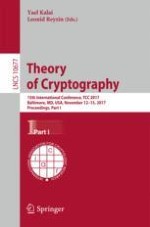2017 | OriginalPaper | Buchkapitel
Round Optimal Concurrent MPC via Strong Simulation
verfasst von : Saikrishna Badrinarayanan, Vipul Goyal, Abhishek Jain, Dakshita Khurana, Amit Sahai
Erschienen in: Theory of Cryptography
Aktivieren Sie unsere intelligente Suche, um passende Fachinhalte oder Patente zu finden.
Wählen Sie Textabschnitte aus um mit Künstlicher Intelligenz passenden Patente zu finden. powered by
Markieren Sie Textabschnitte, um KI-gestützt weitere passende Inhalte zu finden. powered by
Abstract
-
Three-round concurrent MPC with SPS security against Byzantine adversaries, assuming sub-exponentially secure DDH and LWE.
-
Two-round concurrent MPC with SPS security against Byzantine adversaries for input-less randomized functionalities, assuming sub-exponentially secure indistinguishability obfuscation and DDH. In particular, this class includes sampling functionalities that allow parties to jointly sample a secure common reference string for cryptographic applications.
